| Srl | Item |
| 1 |
ID:
053645
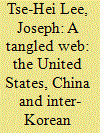

|
|
|
| 2 |
ID:
054379
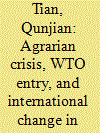

|
|
|
| 3 |
ID:
052180
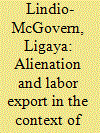

|
|
|
| 4 |
ID:
052488
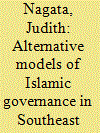

|
|
|
|
|
| Publication |
June 2004.
|
| Summary/Abstract |
In the prevailing political world order, sovereign nation-states and secular political authority widely face competition from transnational religious communities, whose authority and agendas derive from different principles. This is particularly evident in Islam, where ulama may acquire political power, while governments appropriate religious interpretations to their own purposes, and even determine who is orthodox or heretical in their domain. This article focuses on the origins and spread of one Malay Islamic movement, Al Arqam, inspired by a rare mix of global Sufi and strict Shari'ah traditions, many of whose members were organized into residential communes and institutions promoting economic independence, mutual support, social service and extensive mission. With their schools, clinics, farms and factories, this amounted to an experiment in alternative development and governance, although not explicitly as an Islamic state. Arqam's moral example and its success in recruiting technically skilled, highly educated young Malays, however, was perceived by the Malaysian government, as its own loss, and a threat to its legitimacy, and the movement was eventually banned. Through this non-violent ideological confrontation, Arqam became de facto political, as well as a 'heresy', in this local understanding of 'political Islam'.
|
|
|
|
|
|
|
|
|
|
|
|
|
|
|
|
| 5 |
ID:
051966
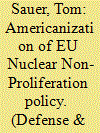

|
|
|
| 6 |
ID:
052820
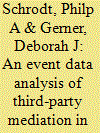

|
|
|
| 7 |
ID:
052662
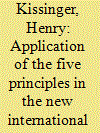

|
|
|
| 8 |
ID:
051986
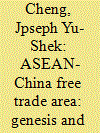

|
|
|
|
|
| Publication |
June 2004.
|
| Summary/Abstract |
The Asia-Pacific region's vulnerabilities to the consequences of globalisation were vividly revealed by its financial crisis in 1997-98. ASEAN states considered the US and APEC less than helpful during the crisis, and they found the conditionalities imposed by the IMF unpalatable. But ASEAN as a regional organisation has been much weakened, and it has been working hard to revive its influence. The 'ASEAN plus 3' approach has been perceived as an important means to strengthen ASEAN's status and relevance. The ASEAN-China Free Trade Area is undoubtedly an outstanding achievement of this approach; but ASEAN has been trying to keep its options open. On the other hand, China has been concerned with the danger of a deterioration in Sino-American relations and the increasing distrust between Tokyo and Beijing. Improvement of China-ASEAN relations therefore assumes increasing significance in China's regional policy; and enhancing mutual interests and interdependence is the best way to erode the ASEAN states' perception of the 'China threat'. But China must not neglect the interests of Japan and South Korea or underestimate ASEAN's resistance to the exclusion of the US and its desire to maintain a balance of power in the region. The ASEAN-China Free Trade Area, hopefully, should also facilitate the narrowing of the gap between the more developed and the developing ASEAN members, as well as that between the more prosperous coastal provinces and the poor interior provinces in China. In many ways, the establishment of the ASEAN-China Free Trade Area represents a challenge to what can be achieved in the mutual engagement process.
|
|
|
|
|
|
|
|
|
|
|
|
|
|
|
|
| 9 |
ID:
052407
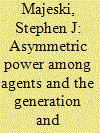

|
|
|
|
|
| Publication |
June 2004.
|
| Summary/Abstract |
The question addressed in this analysis is whether endowing agents with various forms of asymmetric power makes cooperation more likely across a variety of structural settings of conflict and cooperation present in international relations. To address this question, an agent-based model incorporating asymmetric power among agents in a set of (2 2) games that represent different forms of conflict and cooperation prevalent in international relations (Chicken, Stag, Assurance, Deadlock, and Prisoner's Dilemma) is developed and analyzed via simulation. Simulation results indicate that the introduction of asymmetric power substantially increases the chances that both cooperative agents survive and cooperative worlds evolve. This is particularly the case when agents are endowed with the ability to selectively interact with other agents. Also, anticipated variations in outcomes across the game structures regarding the likelihood of cooperation are supported.
|
|
|
|
|
|
|
|
|
|
|
|
|
|
|
|
| 10 |
ID:
052379
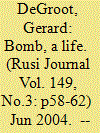

|
|
|
| 11 |
ID:
052378


|
|
|
| 12 |
ID:
052193


|
|
|
| 13 |
ID:
052399
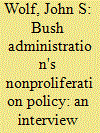

|
|
|
| 14 |
ID:
054383


|
|
|
| 15 |
ID:
052206


|
|
|
| 16 |
ID:
051987
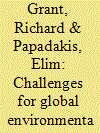

|
|
|
|
|
| Publication |
June 2004.
|
| Summary/Abstract |
One of the predominant issues on the agenda of diplomats and politicians is how to address the consequences of shifts in perception about threats to the environment and the actual short and long-term characteristics and effects of environmental degradation. Another challenge is that such issues as climate change impact on many areas including trade, economic and fiscal policies, employment, transport, agriculture and regional development. Furthermore, decisions taken at a national level cannot be isolated from international concerns, as in the case of the Kyoto Protocol.
This article maps out some of the differences between Australia and the European Union in relation to the role of developing countries in tackling climate change, the use of market mechanisms to tackle environmental problems and the implementation of punitive compliance systems. We explore the challenges facing Australia and the EU in sustainable development, why the EU has a reputation as a leader in this field, how Australia has engaged the challenge and why the similarities in the approach of Australia and the EU are more striking than the differences.
|
|
|
|
|
|
|
|
|
|
|
|
|
|
|
|
| 17 |
ID:
052584
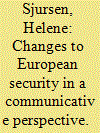

|
|
|
| 18 |
ID:
052400
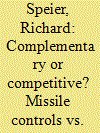

|
|
|
| 19 |
ID:
052557
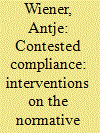

|
|
|
| 20 |
ID:
052462
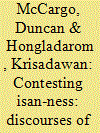

|
|
|
|
|
| Publication |
June 2004.
|
| Summary/Abstract |
This paper discusses the idea of Isan (Northeastern Thai) ethnoregional identity, and its relationship with two major alternative ideas: Thai identity and Lao identity. Drawing on ethnolinguistic research, the paper argues that Isan identity is a problematic political construct, reflecting ambiguous self-understandings and self-representations on the part of Northeasterners. Northeasterners are engaged in a negotiation process about their relationships with Thai and Lao identities, relationships fraught with cultural, social and political ramifications. The study suggests a more nuanced appreciation of the ambiguities of Isan identity than has yet been proposed.
|
|
|
|
|
|
|
|
|
|
|
|
|
|
|
|